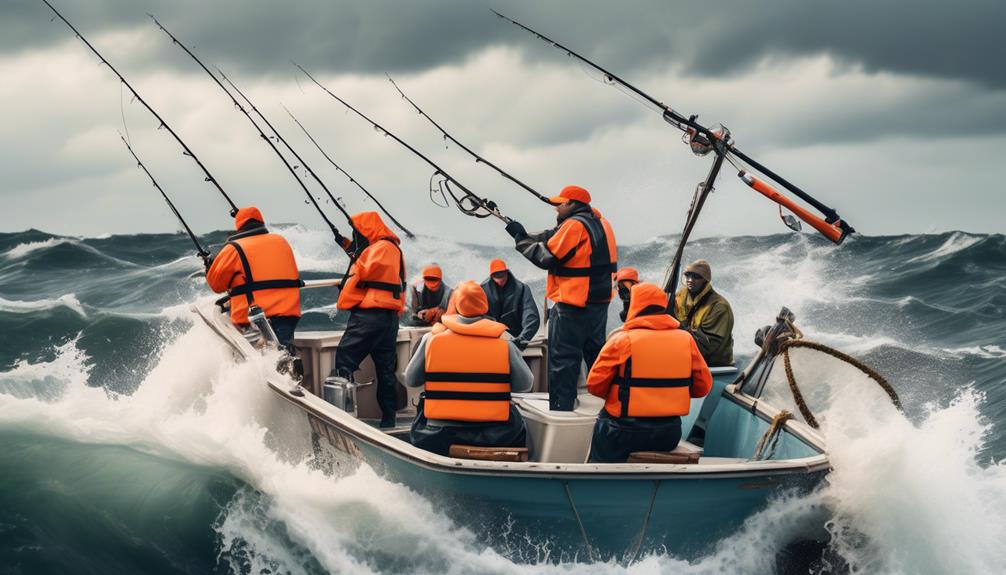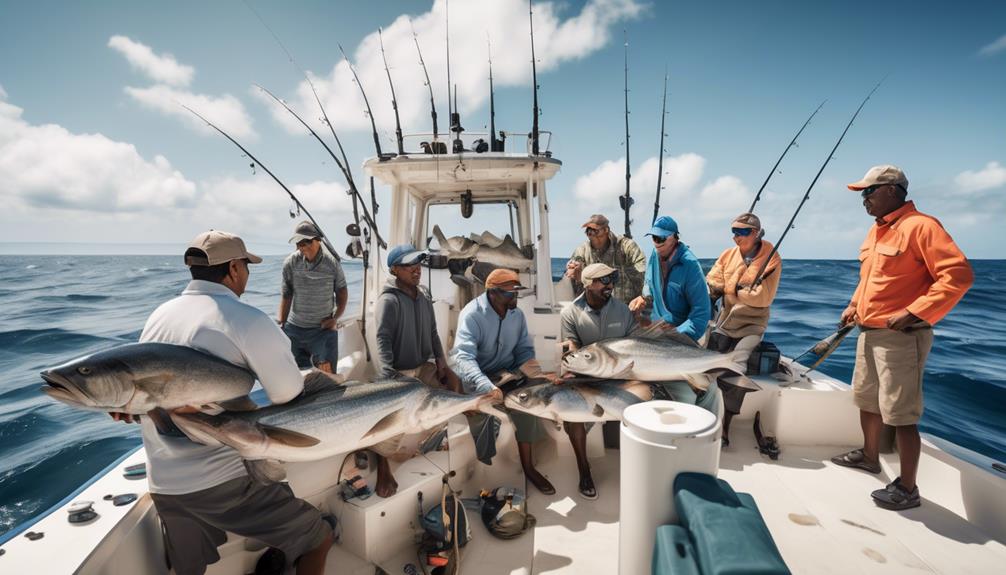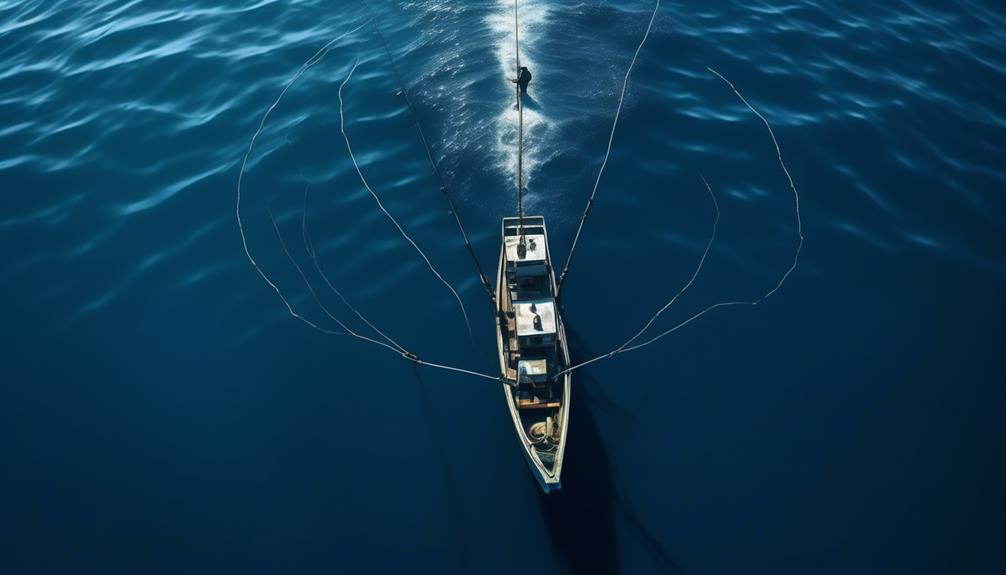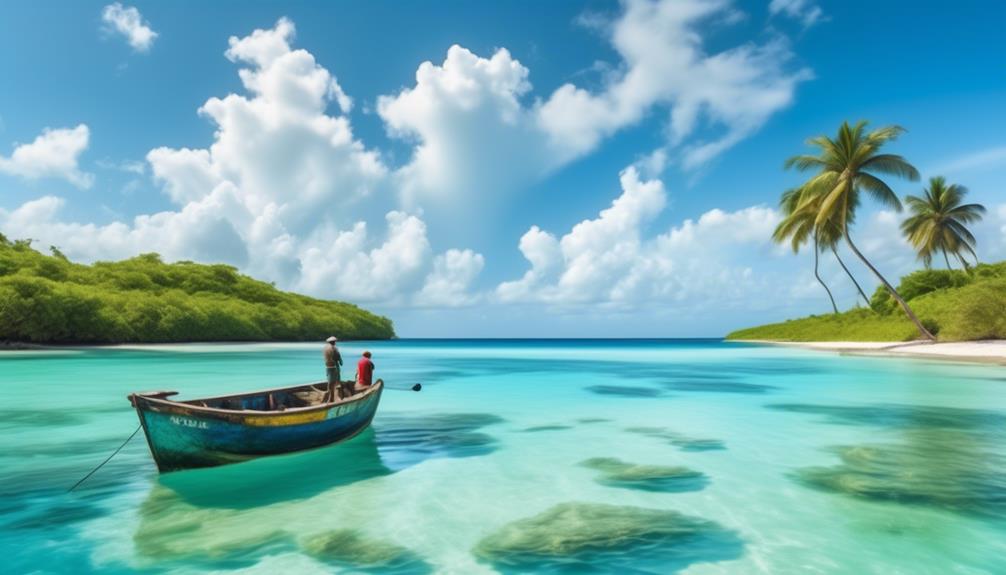You may not be aware that deep sea fishing can be an exhilarating and rewarding experience, but it also comes with its own set of safety considerations that are crucial to understand before embarking on your adventure.
Whether you're a seasoned angler or a novice, the deep sea presents unique challenges that demand careful preparation and vigilance.
By implementing these essential safety tips, you can ensure that your deep sea fishing trip is not only enjoyable but also safe for you and your fellow anglers.
Proper Gear and Equipment
Make sure you have all the necessary gear and equipment before heading out for your deep sea fishing adventure. Proper maintenance of your gear is essential for a safe and successful trip. Inspect your fishing rods, reels, and lines to ensure they're in good working condition. Replace any worn-out or damaged parts to prevent equipment failure while out on the water.
Additionally, don't forget to check your safety equipment such as life jackets, first aid kits, and emergency signaling devices. It's crucial to have these items in case of any unforeseen circumstances.
When it comes to equipment selection, it's important to choose gear that's suitable for deep sea fishing. Select sturdy rods and reels designed to handle the large and powerful fish you may encounter in deep waters. Ensure that your fishing lines are strong enough to withstand the pressure of reeling in big catches.
Having the right equipment can make a significant difference in your overall fishing experience.
Weather Monitoring and Planning
Before embarking on your deep sea fishing trip, ensure to actively monitor the weather and carefully plan your excursion to ensure a safe and enjoyable experience. Weather forecasting plays a crucial role in determining the safety and success of your deep sea fishing trip. Keep an eye on the weather forecast leading up to your planned excursion. Look out for any potential changes in weather patterns, such as storms or high winds, that could impact your trip. It's essential to choose a day with favorable weather conditions for your deep sea fishing adventure.
Trip scheduling is another important aspect of weather monitoring and planning. Take into account the time of year and the typical weather patterns for the location where you plan to go deep sea fishing. During certain seasons, some areas might experience more unpredictable weather, so it's important to schedule your trip accordingly.
Additionally, consider the time of day for your fishing excursion. Weather conditions can vary throughout the day, so planning your trip during a time when the weather is typically more stable can enhance the safety and enjoyment of your experience.
Safety Briefing and Communication
As you plan your deep sea fishing trip, ensuring a safe and enjoyable experience involves not only monitoring the weather but also conducting a thorough safety briefing and establishing clear communication protocols.
Before setting sail, it's crucial to gather all passengers for a comprehensive safety briefing. This should cover the location of safety equipment such as life jackets, fire extinguishers, and emergency flares. Additionally, ensure that everyone knows the emergency procedures, including how to signal for help and the location of emergency exits.
When it comes to communication protocols, establishing a clear plan is essential for keeping everyone safe while out at sea. Make sure that all passengers are aware of how to operate the communication devices on board, such as radios or satellite phones. It's also important to designate a primary point of contact on the boat who's responsible for coordinating communication with authorities or other vessels in case of an emergency.
Ensure that all passengers are aware of who this person is and how to reach them in the event of an emergency.
Personal Health and Hygiene
Ensuring your personal health and hygiene is essential for a safe and enjoyable deep sea fishing experience.
Hydration management is crucial when spending long hours out on the open sea. It's easy to become dehydrated while exposed to the sun and wind, so be sure to drink plenty of water throughout the day. Bring a reusable water bottle on board and make a conscious effort to take regular sips, even if you don't feel particularly thirsty. Dehydration can lead to fatigue and diminished concentration, which can compromise your safety.
In addition to staying hydrated, sun protection is vital for your personal health. The sun's rays can be intense out at sea, and prolonged exposure can result in sunburn, heat exhaustion, or even heatstroke. Apply a broad-spectrum sunscreen with a high SPF before setting out, and reapply it regularly, especially after swimming or sweating. Wearing a wide-brimmed hat and UV-protective sunglasses can also shield you from the sun's harmful effects. Don't forget to seek shade during peak sun hours when possible.
Emergency Preparedness
In case of emergencies, familiarize yourself with the location and proper use of the onboard safety equipment. First aid is crucial, so ensure you have a well-stocked first aid kit on board. Familiarize yourself with basic first aid procedures, especially for treating cuts, burns, or seasickness. Emergency response preparedness involves knowing how to operate communication devices such as radios and distress signals. Learn the appropriate distress signals, including the use of flares and flags, and ensure that all passengers are aware of these signals as well.
Survival techniques are essential for emergency preparedness. Make sure everyone on board knows where the life jackets are stored and how to put them on correctly. In the event of a man overboard situation, knowing how to execute a quick and efficient rescue is vital. Additionally, understanding how to deploy life rafts and survival suits could potentially save lives in dire situations.
It's also important to have a clear understanding of emergency response protocols. Establish a communication plan with the crew and passengers so that everyone knows what to do in case of an emergency. Assign specific roles and responsibilities to each person in the event of an emergency to ensure a coordinated and effective response.
Navigation and Boating Guidelines
When navigating the open sea, always maintain a vigilant lookout for other vessels and potential hazards to ensure safe and smooth sailing. Being aware of your surroundings is crucial for avoiding collisions and navigating through changing conditions. It's essential to familiarize yourself with the waterways, including any restricted zones or areas with shallow depths. Additionally, always adhere to speed limits and traffic rules to prevent accidents and maintain the safety of everyone on board.
Emergency procedures are a vital aspect of boating safety. Ensure that all passengers are aware of the location and proper usage of life jackets and other safety equipment. Familiarize yourself with distress signals and emergency communication devices on board. In the event of an emergency, remain calm and follow established procedures to ensure the safety and well-being of everyone on the boat.
Regular boat maintenance is essential for safe navigation. Inspect the vessel before every trip, checking for any signs of wear and tear, and ensuring that all essential systems are functioning correctly. This includes inspecting the engine, fuel system, navigation lights, and communication devices. Proper maintenance can prevent mechanical failures at sea, reducing the risk of being stranded or encountering difficulties during a voyage.
Wildlife Awareness and Handling
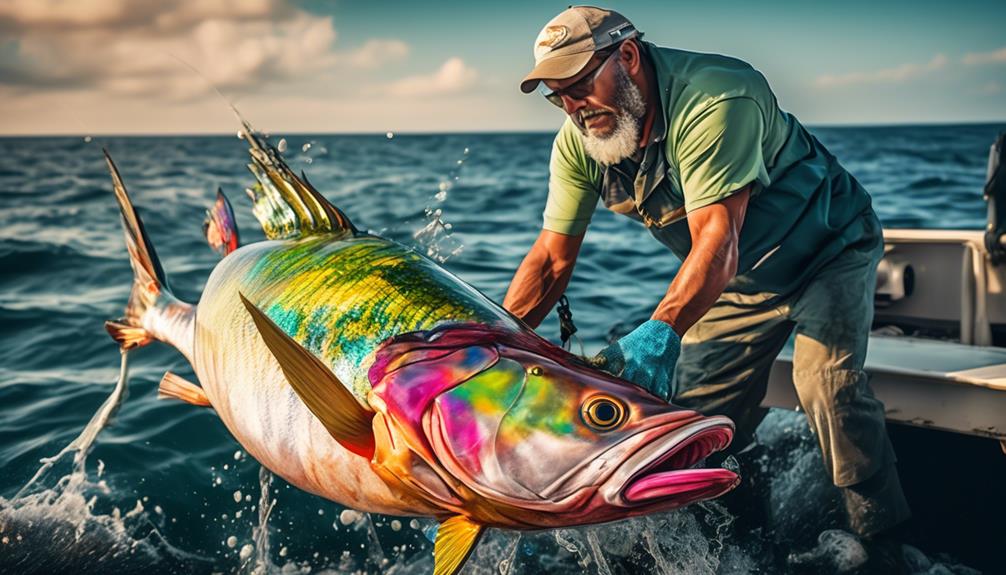
Before setting out for a day of deep sea fishing, it's crucial to be mindful of the marine wildlife that inhabits these waters and to understand the proper handling techniques when encountering them. When you encounter marine life during your fishing trip, it's essential to handle the situation with care and respect. Here are some important points to consider:
- Appreciation: Take a moment to appreciate the beauty of the marine life you encounter. It's a privilege to witness these magnificent creatures in their natural habitat, so approach the situation with awe and wonder.
- Respect: Show respect for the wildlife by maintaining a safe distance and avoiding any sudden or aggressive movements. Remember, you're a guest in their environment, so observe and admire from a respectful distance.
- Conservation: Understand the importance of conservation and responsible fishing practices. By handling catch properly and releasing any unwanted or undersized fish with care, you contribute to the preservation of marine ecosystems for future generations.
When handling your catch, always use the proper techniques to ensure the safety of both yourself and the marine life. Handle fish gently, keeping in mind that they're living creatures deserving of our care and consideration.
Responsible Fishing Practices
Practicing responsible fishing ensures the sustainability of marine ecosystems and the well-being of the marine life you encounter during your deep sea fishing excursions. Sustainable fishing is crucial for maintaining the delicate balance of oceanic ecosystems. To support sustainable fishing, it's important to adhere to ethical angling practices.
When engaging in deep sea fishing, consider the following responsible fishing practices.
First and foremost, always abide by fishing regulations and catch limits set by local authorities. These regulations are in place to protect fish populations from overexploitation and ensure their long-term sustainability. By respecting catch limits, you contribute to the conservation of marine life and help maintain a healthy ecosystem.
Furthermore, practicing catch and release whenever possible is a key aspect of responsible fishing. If you don't intend to keep the fish for consumption, handle it carefully and release it back into the water unharmed. This ethical angling practice helps preserve fish populations and allows them to continue fulfilling their ecological roles in the marine environment.
Additionally, using non-destructive fishing gear and techniques, such as circle hooks and barbless hooks, can minimize harm to marine life and reduce bycatch. By employing these methods, you actively participate in responsible and sustainable fishing practices.
Frequently Asked Questions
Are There Any Specific Safety Precautions for Deep Sea Fishing in Areas With High Levels of Marine Traffic?
When deep sea fishing in areas with high marine traffic, it's essential to be aware of navigation and prioritize safety. Stay alert for large vessels and maintain communication to avoid potential collisions and ensure a safe fishing experience.
What Should I Do if I Encounter a Large Marine Predator While Deep Sea Fishing?
If you encounter a large marine predator while deep sea fishing, stay calm and slowly move away. Keep a safe distance and avoid sudden movements. Ensure your safety equipment is accessible in case of emergency.
How Can I Ensure the Safety of My Catch While on the Boat?
To ensure the safety of your catch while on the boat, use proper storage methods and handling techniques. Prevent spoilage by considering onboard refrigeration solutions. This will help maintain the quality of your catch.
What Measures Should I Take to Prevent Seasickness While Deep Sea Fishing?
To prevent seasickness while deep sea fishing, take over-the-counter medication, stay hydrated, and avoid heavy meals. Use safety equipment, know emergency protocols, handle your catch carefully, and learn proper fishing techniques to ensure a smooth trip.
Are There Any Specific Safety Tips for Fishing in Deep Sea Trenches or Canyons?
When fishing in deep sea trenches or canyons, always prioritize safety. Secure your Deep Sea Fishing Tackle properly and learn the necessary Deep Sea Fishing Techniques. Be aware of potential hazards and always follow safety guidelines.
Conclusion
So, next time you head out for a deep sea fishing adventure, remember to:
- Pack the right gear
- Keep an eye on the weather
- Communicate with your crew
Stay healthy, be prepared for emergencies, and follow navigation and boating guidelines.
Respect wildlife and practice responsible fishing.
By following these crucial safety tips, you can ensure a successful and enjoyable deep sea fishing experience.
Happy fishing!
